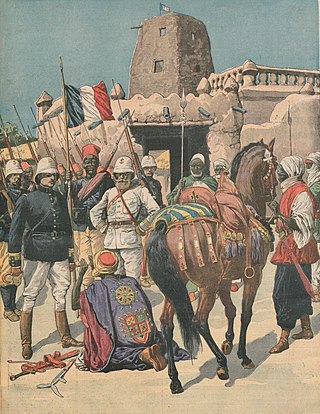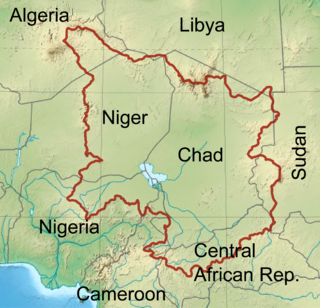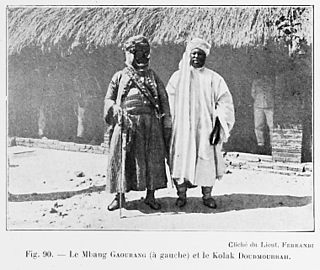Related Research Articles
Chad, officially the Republic of Chad, is a landlocked country in Central Africa. It borders Libya to the north, Sudan to the east, the Central African Republic to the south, Cameroon and Nigeria to the southwest, and Niger to the west. Due to its distance from the sea and its largely desert climate, the country is sometimes referred to as the "Dead Heart of Africa".

The Senusiyya, Senussi or Sanusi are a Muslim political-religious Sufi order and clan in colonial Libya and the Sudan region founded in Mecca in 1837 by the Grand Sanussi, the Algerian Muhammad ibn Ali al-Sanusi. Sanusi was concerned with what he saw as both the decline of Islamic thought and spirituality and the weakening of Muslim political integrity.

Central Africa is a subregion of the African continent comprising various countries according to different definitions. Middle Africa is an analogous term used by the United Nations in its geoscheme for Africa and consists of the following countries: Angola, Burundi, Cameroon, Central African Republic, Chad, Democratic Republic of the Congo, Republic of the Congo, Equatorial Guinea, Gabon, Rwanda, and São Tomé and Príncipe. These eleven countries are members of the Economic Community of Central African States (ECCAS). Six of those countries are also members of the Economic and Monetary Community of Central Africa (CEMAC) and share a common currency, the Central African CFA franc.

Darfur is a region of western Sudan. Dār is an Arabic word meaning "home [of]" – the region was named Dardaju while ruled by the Daju, who migrated from Meroë c. 350 AD, and it was renamed Dartunjur when the Tunjur ruled the area. Darfur was an independent sultanate for several hundred years until 1874, when it fell to the Sudanese warlord Rabih az-Zubayr. The region was later invaded and incorporated into Sudan by Anglo-Egyptian forces in 1916. As an administrative region, Darfur is divided into five federal states: Central Darfur, East Darfur, North Darfur, South Darfur and West Darfur. Because of the War in Darfur between Sudanese government forces and the indigenous population, the region has been in a state of humanitarian emergency and genocide since 2003. The factors include religious and ethnic rivalry, and the rivalry between farmers and herders.
Baguirmi is a department of Chad, one of three in the Chari-Baguirmi Region. It takes its name from the kingdom of Baguirmi. Its capital is Massenya.

The Wadai Sultanate was an African sultanate located to the east of Lake Chad in present-day Chad and the Central African Republic. It emerged in the seventeenth century under the leadership of the first sultan, Abd al-Karim, who overthrew the ruling Tunjur people of the area. It occupied land previously held by the Sultanate of Darfur to the northeast of the Sultanate of Baguirmi.

Chad was a part of the French colonial empire from 1900 to 1960. Colonial rule under the French began in 1900 when the Military Territory of Chad was established. From 1905, Chad was linked to the federation of French colonial possessions in Middle Africa, known from 1910 under the name of French Equatorial Africa. Chad passed in 1920 to French civilian administration, but suffered from chronic neglect.
The Tunjur people are a Sunni Muslim ethnic group living in eastern Chad and western Sudan. In the 21st century, their numbers have been estimated at 175,000 people.

Rabih az-Zubayr ibn Fadl Allah or Rabih Fadlallah, usually known as Rabah in French, was a Sudanese warlord and slave trader who established a powerful empire east of Lake Chad, in today's Chad.

The Maba or Bargo people are a Sunni Muslim ethnic group found primarily in the mountains of Wadai region in eastern Chad and southern Sudan. Their population is estimated to be about 542,000. Other estimates place the total number of Bargo people in Sudan to be about 25,000.

The Wadai War was waged by France and its African allies against the Wadai Empire and its allies from 1906 to 1912. Located in what today would be eastern Chad and western Sudan, Wadai fiercely resisted the French invasion. Regardless, much of Wadai including its capital Abéché fell to the invaders in 1909, forcing the empire's ruler Dud Murra to continue his resistance from outlying provinces and allied states. He managed to gain the support of the Sultanate of Darfur and Dar Masalit, and used these areas as rear bases during his attempts to oust the French. Doing so, he enjoyed some success, and inflicted several defeats on French-led forces. In order to legitimize their intervention, the French installed Dud Murra's relative Adam Asil as puppet ruler in Wadai. After losing most of his forces and allies, Dud Murra was forced to surrender in 1911. Regardless, unrest initially continued: a major anti-French revolt broke out soon after Dud Murra's defeat, and an anti-European conspiracy was allegedly organized with the support of Adam Asil. The last effective anti-French resistance in Wadai was suppressed by 1912 and the region remained a part of French colonial empire until 1960.

Throughout its history, Darfur has been the home to several cultures and kingdoms, like the mythical Tora or the Daju and Tunjur kingdoms. The recorded history of Darfur begins in the seventeenth century, with the foundation of the Fur Sultanate by the Keira dynasty. In 1875, the Anglo-Egyptian Co-dominion in Khartoum ended the dynasty. The British allowed Darfur a measure of autonomy until formal annexation in 1916. However, the region remained underdeveloped through the period of colonial rule and after independence in 1956. The majority of national resources were directed toward the riverine Arabs clustered along the Nile near Khartoum. This pattern of structural inequality and overly underdevelopment resulted in increasing restiveness among Darfuris. The influence of regional geopolitics and war by proxy, coupled with economic hardship and environmental degradation, from soon after independence led to sporadic armed resistance from the mid-1980s. The continued violence culminated in an armed resistance movement around 2003.
The Daju people are a group of seven distinct ethnicities speaking related languages living on both sides of the Chad-Sudan border and in the Nuba Mountains. Separated by distance and speaking different languages, at present, they generally have little cultural affinity to each other.

The Sultanate of Darfur was a pre-colonial state in present-day Sudan. It existed from 1603 to 24 October 1874, when it fell to the Sudanese warlord Rabih az-Zubayr, and again from 1898 to 1916, when it was occupied by the British and the Egyptians and was integrated into Anglo-Egyptian Sudan. At its peak in the late 18th and early 19th century it stretched all the way from Darfur in the west to Kordofan and the western banks of the White Nile in the east, giving it the size of present-day Nigeria.
Muhammad 'Abd al-Karim Sabun was (Sultan) of Wadai, a Muslim state in what is now eastern Chad, from 1804 to 1815. He pursued an expansionist policy, and was the greatest of the rulers of Wadai.

The Chad Basin is the largest endorheic basin in Africa, centered approximately on Lake Chad. It has no outlet to the sea and contains large areas of semi-arid desert and savanna. The drainage basin is approximately coterminous with the sedimentary basin of the same name, but extends further to the northeast and east.

Abd ar-Rahman Gaourang II was Mbang of Bagirmi from 1885 to 1918. He came to power at a time when the sultanate was in terminal decline, subject to both Wadai and Bornu. The Sudanese warlord Rabih az-Zubayr made him his vassal in 1893. Gaourang signed a treaty that made his sultanate a French protectorate in 1897. After the final defeat of Rabih in 1900 he ruled as a subordinate of the French in Chad until his death in 1918.

Muhammad Salih bin Yusuf, known as Dud Murra or Dudmurrah, was the last independent ruler, or kolak, of the Wadai Empire. He allied with the Sanusi, powerful traders of the eastern Sahara, and with the Sultan of Darfur to resist French aggression in the eastern Sahel, but was defeated. His sultanate was incorporated in the French military territory of Chad.
The Tunjur kingdom was a Sahelian precolonial kingdom in Africa between the 15th and early 17th centuries.
References
- 1 2 3 4 5 6 7 8 9 10 Stewart, John (2006). African States and Rulers (Third ed.). Jefferson: McFarland & Company, Inc. p. 233. ISBN 0-7864-2562-8.
- 1 2 3 "Uproar over sultan's appointment in Chad". BusinessGhana. Retrieved 2023-10-26.
- 1 2 "Spécial Ouaddaï : le sultan Cherif Abdelhadi Mahdi est-il vraiment un inconnu?". Tchadinfos.com (in French). 2019-08-22. Retrieved 2023-10-26.